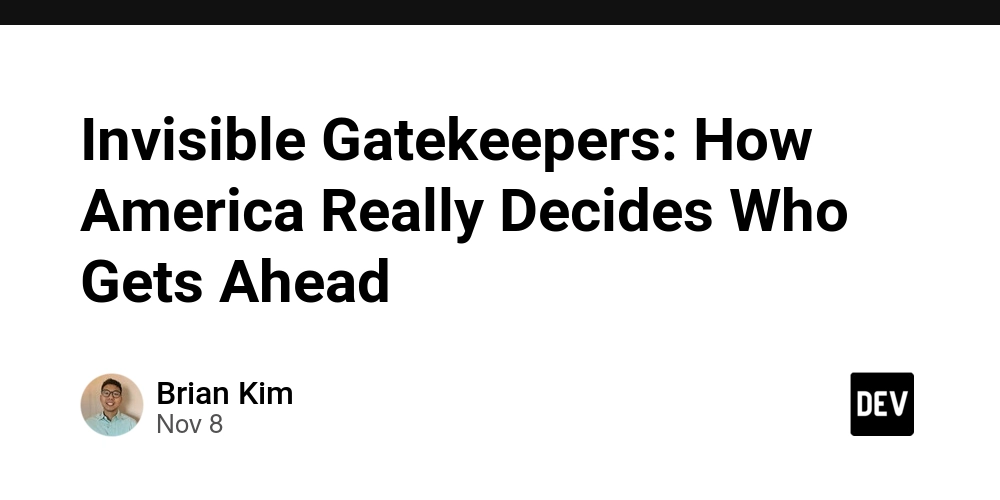TL;DR: Success in America isn’t purely about talent or hard work. Invisible gatekeepers — networks, media, technology, education, finances, culture, mentorship, bureaucracy, and psychology — quietly decide who gets ahead. The real way to succeed? Awareness and strategic alignment, not trying to “escape” the system.
I watched my wealthy friends walk into rooms like they owned them.
They didn’t just talk — they moved.
Shoes clicked on marble floors. Eyes scanned for familiar faces. Hands ready to shake or drop a name.
Opportunities appeared around them like magic.
I later realized: it wasn’t magic.
It was fluency.
A fluency I wasn’t taught.
Meanwhile, the rest of us?
We’re told: “work harder.” “Prove yourself.” “Don’t give up.”
Fail once, and the world tells you it’s entirely on you.
Opportunity in America isn’t broken.
It’s curated.
Invisible gatekeepers decide who rises, who stumbles, and who never even sees the doors.
Most people never see the strings. Most people never know how tightly their lives are being nudged, filtered, and guided.
Networks & Social Fluency
Some doors are invisible unless you know how to knock.
Social fluency and mentorship define more than raw talent.
Social Fluency:
Imagine a 16-year-old mentions a hobby to a parent.
That parent casually introduces them to a CEO. Six months later: internship, job offer, life trajectory rewritten.
Meanwhile, someone equally talented stumbles. Not for lack of skill. Not for lack of effort. But because they didn’t know the handshake, the timing, the unwritten code.
Mentorship / Sponsorship:
Access to mentors or sponsors is rarely random.
Who you know often determines promotions and high-profile opportunities.
Many high-achievers plateau not because of skill, but because they lack sponsors advocating for them behind the scenes.
📌 Note: Awareness of these networks is the first step — then learning to navigate them strategically.
Structural Systems: Education, Finance & Bureaucracy
The rules aren’t always written down, but they exist.
Education:
Elite schools, tutoring, and extracurriculars often require wealth, location, or connections.
Legacy admissions and alumni networks favor some groups while excluding others.
Finance:
Wealth enables risk-taking: starting a business, relocating for a job, taking unpaid internships. Debt and systemic barriers constrain others.
Legal / Bureaucratic:
Laws, regulations, and bureaucracy favor some groups over others.
A friend once delayed a career move for months because of a permit issue that someone more connected solved in days.
💡 Impact: Structural advantages accumulate quietly. Those born outside these systems must work exponentially harder to achieve similar outcomes.
Media & Technology
The narratives we consume and the algorithms we interact with shape opportunity.
Media Narratives:
The viral “rags-to-riches” headline. The feel-good piece. The sensationalized overnight success story.
They tell us: anyone can rise if they try hard enough. Meanwhile, the rules behind success remain invisible.
Technology:
Every click, swipe, and interaction is tracked.
Algorithms decide which resumes are seen, which posts go viral, and which opportunities appear in your feed.
Even tools we think free us often reinforce hierarchy.
💡 Example: TikTok and LinkedIn amplify creators and professionals who already have visibility. The “grassroots” narrative is seductive, but power lies in data-driven amplification.
❗ The Illusion of Escape: We chase hacks, side hustles, and shortcuts — thinking we can beat the system. But the strings adjust. The system moves whether we notice it or not.
Culture & Psychology
Talent alone isn’t enough. Social cues, confidence, and perception shape who thrives.
Culture:
Norms around speech, dress, and behavior influence credibility.
Unwritten codes define belonging in elite spaces.
Psychology:
Social conditioning shapes ambition and self-perception.
Underprivileged individuals may self-limit due to lifelong exposure to cues about who “belongs” and who doesn’t.
❗ Impact: These factors can prevent people from even attempting to engage with opportunity, long before gatekeepers act externally.
My Personal Moment
I thought I could “break” the system. I spent months networking, learning hacks, chasing shortcuts. I felt clever.
Until I realized: every door I opened had invisible strings attached. I wasn’t free. I was moving within someone else’s design. Awareness changed everything — not freedom, but strategy.
The Ugly Truth
America’s opportunity isn’t broken. It’s filtered.
Networks, media, technology, education, finances, culture, mentorship, bureaucracy, and psychology act as invisible gatekeepers — determining who succeeds, who fails, and who never gets a fair shot.
Talent matters. Sometimes. Effort matters. Occasionally.
More often, success is about fluency, access, and alignment with hidden systems.
Meritocracy isn’t absent. It’s conditional.
Rare exceptions exist. Some escape entirely, but those exceptions become the headlines — not proof of fairness.
The secret most people miss: The real way to succeed isn’t escaping the system.
It’s learning to move with it.
Subtle, strategic alignment becomes the hidden solution.
You don’t break the system.
You learn its rhythm.
You follow the strings until you can pull them to your advantage.
Reflection: Are We Free?
Are we citizens of a free society, or participants in a social experiment — measured, nudged, monetized?
Awareness is power. Knowing the system is often more valuable than raw talent.
The Challenge
- Stop pretending meritocracy is real.
- Learn the rules others take for granted.
- Build networks intentionally.
- Question who profits from your choices.
- Don’t try to escape — move strategically within the system.
Because the gatekeepers are watching.
Freedom is conditional.
Awareness is your tool.
💡 Key Takeaways
- Privilege isn’t wealth — it’s fluency in invisible rules.
- Media glorifies exceptions and hides systemic inequity.
- Networks, technology, education, finances, culture, mentorship, bureaucracy, and psychology all shape opportunity.
- Success is curated, not purely earned.
- Awareness and strategic alignment are your first tools.
Discussion Questions
- Have you noticed invisible gatekeepers in your own life? How did you navigate them?
- Do you believe escaping the system is possible, or is alignment the only path?
- Which gatekeeper do you think affects opportunity the most?



